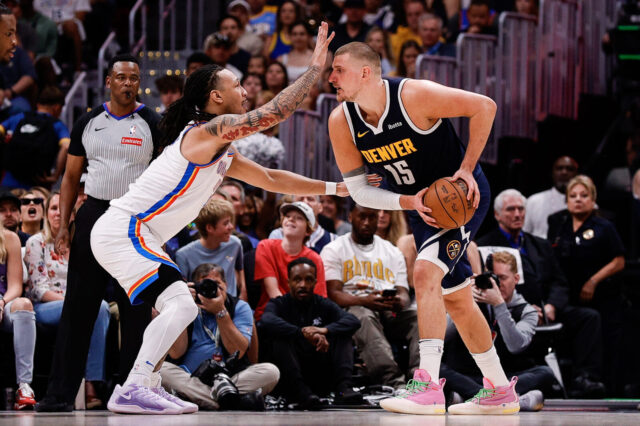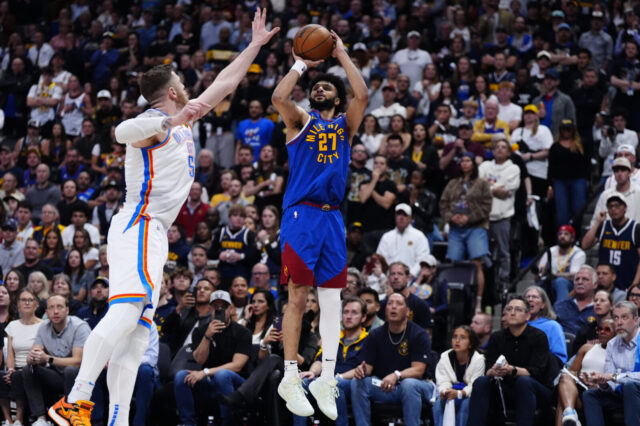The excellent 2011 NBA playoffs made me crave important basketball games. The only way to get more great games is to cut down the regular season – and just how much of the 82 game schedule would I like to see sliced up? You'll have to read on to find out …
The best regular season record the NBA has ever seen came during the 1995-96 season when the Chicago Bulls posted a 72-10 record (interestingly enough, the Nuggets beat those Bulls at McNichols Arena and I was in attendance … in the nosebleeds). The Bulls went on to win it all that season, like they did often during the 1990’s, and the benchmark for great teams was set.
The 1996-97 Bulls made a run at their own record, but fell short at 69-13 – yet that Bulls team again won the NBA title. And after the 1999-00 Los Angeles Lakers won the title, after finishing 67-15 in the regular season, we suddenly had seven out of eight teams that finished with 67+ wins going on to become NBA champions. At that point in time, only the 1972-73 Boston Celtics failed to win a title after finishing 68-14 – losing in the Eastern Conference Finals.
But what has happened this past decade in the NBA? With more teams in the league since even the 1990’s, talent has been spread even thinner. But even with the thin talent, we have seen some good teams post nice regular season records. The only time the NBA hasn’t seen at least a 60-win team was during the 2000-01 season when the San Antonio Spurs posted a league best 58-24 record.
Since that 2000-01 season there have been at least one 60-win team during every season, in fact there have been 15 teams to win at least 60 games during the regular season. But out of those 15 teams since 2001-02, only three of them have become NBA champs – a percentage .200. But you could say that only 10 teams could have won the title and 30% of the time a 60+ win team has won the title. If we were talking about baseball batting averages I would be pretty happy with a .300 chance, but in the NBA what is the point of reaching 60+ wins if it doesn't necessarily mean you'll win the title? Let's take a peek at what has happened over the years to teams who have won 60+ games:
| Team | Result | Team | Result | Team | Result | Actual Champions | |
| 2010-11 | Bulls 62-20 |
Lost in ECF | Spurs 61-21 |
Lost 1st Rnd | Mavericks 57-25 |
||
| 2009-10 | Cavaliers 61-21 |
Lost EC Semi Finals | Lakers 57-25 |
||||
| 2008-09 | Cavaliers 66-16 |
Lost ECF | Celtics 62-20 |
Lost EC Semi Finals | Lakers 65-17 |
Won Finals | Lakers 65-17 |
| 2007-08 | Celtics 66-16 |
Won Finals | Celtics 66-16 |
||||
| 2006-07 | Mavericks 67-15 |
Lost 1st Rnd | Suns 61-21 |
Lost WC Semi Finals | Spurs 58-24 |
||
| 2005-06 | Pistons 64-18 |
Lost ECF | Spurs 63-19 |
Lost WC Semi Finals | Heat 52-30 |
||
| 2004-05 | Suns 62-20 |
Lost WCF | Spurs 59-23 |
||||
| 2003-04 | Pacers 61-21 |
Lost ECF | Pistons 54-28 |
||||
| 2002-03 | Spurs 60-22 |
Won Finals | Spurs 60-22 |
||||
| 2001-02 | Kings 61-21 |
Lost WCF | Lakers 58-24 |
*ECF = Eastern Conference Finals
**WCF = Western Conference Finals
As you can see from the list above … 60+ wins don’t guarantee you a title, but you also can’t win a title if you don’t reach at least 52 wins as the Miami Heat did (the lowest number of wins for a championship team since 2002) during the 2005-06 season. So the best team doesn’t always win, but you also can’t skate by in the NBA either. There are not any 40-something win teams bragging about being champions. Since joining the NBA, the Nuggets have posted 50+ wins seven times. And reaching that 52 win plateau that the Heat did? The Nuggets have actually reached 52+ wins just four times since 1976. So, you could say that the Nuggets have had four legit shots to win an NBA title based on their win totals from the regular season.
But why is it that NBA teams play 82 games during the regular season? How did that number get pulled out of the air? Let's break down the 82 game schedule really quick, using the 2010-11 Nuggets as the example:
2010-11 Denver Nuggets schedule breakdown:
-Nuggets vs. the Eastern Conference: 20-10 – the Nuggets played each of the 15 Eastern Conference teams twice, one home game in Denver and one away game at the opposition’s place.
-Nuggets vs. the Western Conference: 30-22
-vs. the Northwest: 9-7 (four games each against their division opponents)
-vs. the Pacific: 12-6
-vs. the Southwest: 9-9
+______________
82 games and a 50-32 record.
Now, let's break that schedule down a bit more …
First off, what is the dumbest thing about the NBA schedule? It's easily the back-to-back games. The Nuggets went, an impressive, 10-9 this season in the second games of their back-to-back sets. But there are no back-to-back playoff games, so why are the teams playing them? They don't lead to anything. Get rid of them. If the Nuggets cut out the 19 games of the back-to-back sets their record would have gone from 50-32 to 40-23 – the win percentage increases from .609 to .635 (thanks Lack), but I firmly believe that the back-to-back games are plaguing the NBA.
The record of teams traveling from Portland (and formerly Seattle) to Denver to play the Nuggets on the second of a back-to-back have a combined record of something like 1-999. There is just no point in having teams play in something during the regular season that they have no chance of getting themselves into during the post-season. It's like having a job as an accountant and being asked to learn how to juggle before tax season approaches, but once tax season begins nobody is breaking out the juggling swords. And this isn't even getting into what these games do for the sheer entertainment of the games.
Sure, it’s fun to watch the Nuggets blow teams out at home, especially if you are there. The J.R. Smith three-point barrages in the fourth quarter would be missed, but wouldn’t you rather pay to see a game where the opposition is giving their all to beat your team and your team is rising to the occasion to defend their home floor? So, right there we could potentially eliminate 19 games off the 82 game schedule.
The Nuggets play the Eastern Conference teams in a home-and-away set for a total of 30 games. Why play all Eastern Conference teams home-and-away? Do we really need to see Carmelo Anthony at the Pepsi Center every season? What’s the point of that? I can live without seeing the Knicks, Celtics, or Heat every season in Denver. Wouldn’t limiting those games make those games more special (like the National and American league games in MLB) … even though one out of 82 is pretty special, to the fans … not to the players. Why not just break it up so that the Nuggets play in New York one season and in Denver the next season, but not both. We could cut potentially cut out 15 games right there.
Why do the Nuggets get to play their division teams four times and other teams in the West just three times? What if your division stinks? Then teams are getting more wins for just having bad teams placed in their division. Rivalries have pretty much become obsolete since free agency has taken over. With players swapping uniforms like a game of hot potato – and not to mention the friendships developed during Amateur Athletic Union (AAU) – rivalries are more about the names on the front of the jerseys than anything else. Houston will always hate Dallas and San Antonio because geographic rivalries and historic rivalries (Lakers vs. Celtics) will not go away. All things being equal, why not just do away with the divisions and play each Western Conference team three times. Why three? To create tiebreakers, plain and simple. So, instead of playing 52 games against the Western Conference – we can cut that down to 42 games by playing three games against each Western Conference team. As Nuggets fans, we’ll always want to beat the Jazz, Lakers, Thunder, Blazers, and others because they are in the Western Conference. The playoffs have more to do with creating rivalries than half-hearted played regular season games anyway.
And with less regular season games, there might be wiggle room to have play-in games to make the playoffs. I still maintain that one of the best sporting events I've ever attended was Game 163 at Coors Field for the Colorado Rockies vs. the San Diego Padres – a game that would allow the Rockies to not only make the playoffs, but eventually earn their first trip to the World Series.
I do not think that contraction is a real possibility for the NBA. There has been talk of getting rid of the New Orleans Hornets, but the most likely thing for the Hornets is relocation, not contraction. If contraction or expansion did occur, then my system would have to be tweaked. But I would like to see the NBA cut down the 82 game regular season to a 57 game season.
57 game breakdown for the Nuggets:
-15 games against the Eastern Conference: one game vs. each team and a mix of which ones are home and away.
-42 games against the Western Conference: three games vs. each of the 14 teams.
+__________
57 games
We could easily eliminate the back-to-back games and suddenly each game has tremendously more meaning. Teams wouldn't be able to take as many nights off and teams wouldn't have to play those insane four games in five nights. With a shorter season we might see careers last longer and cut down on some of the wear-and-tear the players face. I guess you could argue that with the games meaning more that injuries would have to go up since effort would go up. And you could also make some claims about playing a heavy dose of same conference games, but then the Finals would truly show which conference was better.
I'm sick of seeing meaningless games. It might take some getting used to and to figure out how many wins makes a great team, but like the 1995-96 Bulls taught us, eventually that team will come along and set the bar. The NBA should be trying to figure out a way to get more butts in the seats and having 82 games where plenty of them come across as "boring" or "going through the motions" isn't working.
The 2006-07 67-win Mavericks and the 2010-11 61-win Spurs showed us that great regular season teams can get torpedoed in the first-round of the playoffs. So what did those great regular seasons mean? Absolutely nothing.
By cutting down 82 to 57, the NBA could do some serious addition by subtraction.
Nate_Timmons on Twitter https://twitter.com/#!/Nate_Timmons
[email protected]
This content is no longer available.


